新概念第一册第49-50课
新概念第一册49课
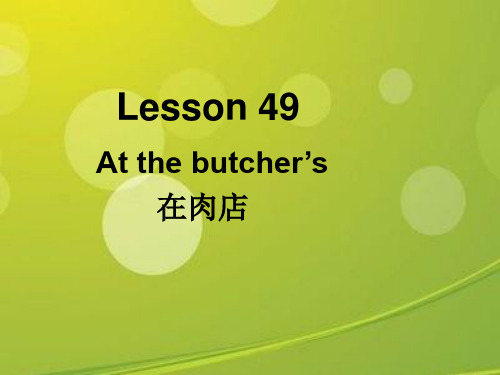
一般现在时
肯定结构
1.主语 + be +其它. 如:It is cold today.
2.主语 + 动词原形+其它 如:I want an apple.
3.主语 + 动词+s/es(第三人称单数作主语时) 如: She likes apples.
否定结构
1.主语 + be + not+其它. 2.主语 + don’t + 动词原形 3.主语 + doesn’t+ 动词原形
4. She lives in a small town near New York. (改为一般疑问句)
Does she live in a small town near New York?
三、选择题。
(C)1.-- _____Ann like beer?
--Yes, ______. A. Does, he do. B. is, she is. C. Dose, she does.
~ the time in English 用英语报时 ~ a lie撒谎 ~ the truth说实话 2)truth n.实情 true adj.真实的
3)either“也” 用于否定的情况,位于句末
too “也”用于肯定的情况,位于句末
• I don’t like chicken__e_it_h_er_ ! • He likes smoking and I like it_t_o_o_.
A. likes, doesn’t B. don’t like, do C. likes, didn’t
(A) 5. Lucy doesn’t want____ any bread. She feels like _____some
新概念英语第一册第49-50课
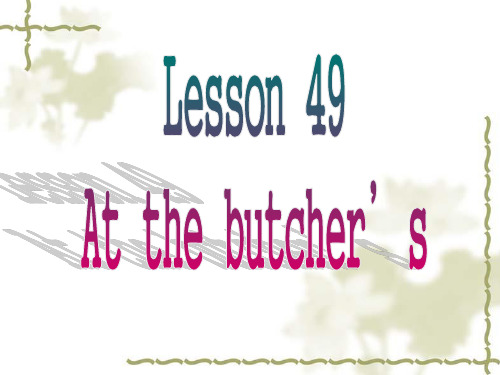
butcher
❖ ---Do you eat meat every day? ❖ 你每天都吃肉吗? ❖ --- _____________.
Key words
u.n.
beef
meat--肉类统称
lamb mutton
butcher
steak mince
I have to go to the butcher’s.
doctor – doctor’s
在英文表示“某一商店”的商店中,往往可 以把shop省略,如课文中的the butcher’s (shop)和the greengrocer’s (shop),类似 的例子还有the hairdresser’s (shop),the stationer’s (shop),the doctor’s (office), my mother’s (house)等。
❖ --- Does she like bananas? --- Yes, she do. She like bananas, but she doesn’t want any.
Orange, sweet orange
❖--- Do you like oranges? ❖--- Yes, I do.
I don't like chicken either!
Detailed study about the passage
❖At the butcher’s在肉店
❖ 方位副词at与in的区别是,at和in在…里;但 at表示的地方较小,而in表示的地方很大, 例:
❖ at the school ❖ at home ❖ in China ❖ in Asia ❖ in Changzhou
新概念一 L49-50
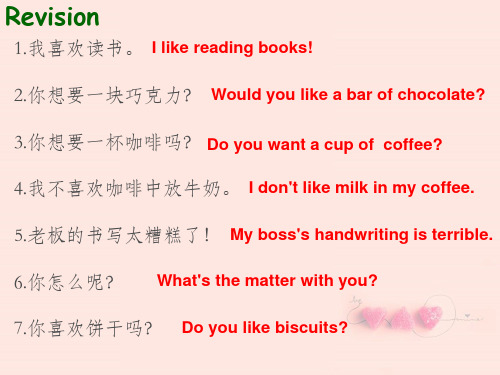
To tell you the truth, Mrs. Bird, I don’t like chicken either!
1)tell v. 告诉 tell sb sth 告诉某人某事 tell sb to do sth. 告诉某人做某事
~ the time in English 用英语报时 ~ a lie 撒谎 ~ the truth 说实话 2)truth n.实情 true adj.真实的
疑问句
借助助动词提问do/does Do / Does + 主语+动词~
你每天说英语吗? Do you speak English every day? (主语为 I, you及复数时, 助动词用do)
他每天说英语吗 ? Does he speak English every day?
(主语为第三人称单数时,助动词用do)
在英文表示“某一商店”的商店中, 往往可以把shop省略
eg . at the hairdresser’s (shop) 理发店
lamb [læ m] n. 羊羔[C];羔羊肉[U]
e.g: 你想要些羔羊肉吗?
Would you like some lamb?
农场里有几只羔羊?
How many lambs are there on the farm?
选择疑问句( …or…)
你想要一个苹果还是一个香蕉呢? Do you want an apple or a banana ? An apple please! /A banana,please!
Truth or dare! 真心话大冒险(a game)
To be or not to be, that’s a question. 生存还是毁灭?这是个问题。
新概念英语第一册课后练习题及答案:49-50
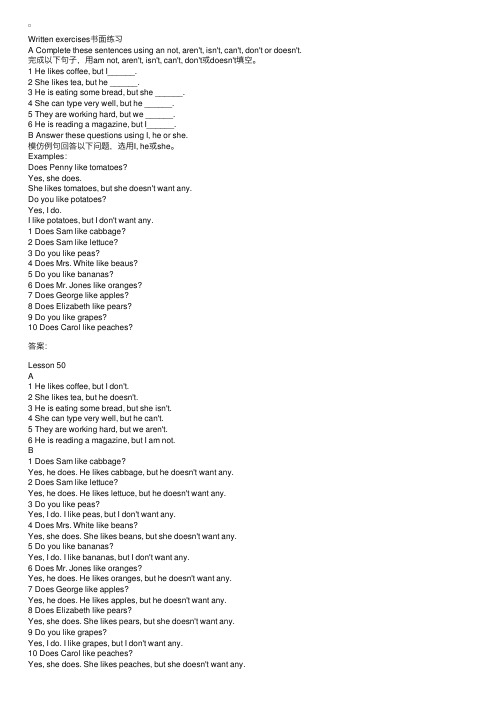
Written exercises书⾯练习A Complete these sentences using an not, aren't, isn't, can't, don't or doesn't.完成以下句⼦,⽤am not, aren't, isn't, can't, don't或doesn't填空。
1 He likes coffee, but I______.2 She likes tea, but he ______.3 He is eating some bread, but she ______.4 She can type very well, but he ______.5 They are working hard, but we ______.6 He is reading a magazine, but I______.B Answer these questions using I, he or she.模仿例句回答以下问题,选⽤I, he或she。
Examples:Does Penny like tomatoes?Yes, she does.She likes tomatoes, but she doesn't want any.Do you like potatoes?Yes, I do.I like potatoes, but I don't want any.1 Does Sam like cabbage?2 Does Sam like lettuce?3 Do you like peas?4 Does Mrs. White like beaus?5 Do you like bananas?6 Does Mr. Jones like oranges?7 Does George like apples?8 Does Elizabeth like pears?9 Do you like grapes?10 Does Carol like peaches?答案:Lesson 50A1 He likes coffee, but I don't.2 She likes tea, but he doesn't.3 He is eating some bread, but she isn't.4 She can type very well, but he can't.5 They are working hard, but we aren't.6 He is reading a magazine, but I am not.B1 Does Sam like cabbage?Yes, he does. He likes cabbage, but he doesn't want any.2 Does Sam like lettuce?Yes, he does. He likes lettuce, but he doesn't want any.3 Do you like peas?Yes, I do. I like peas, but I don't want any.4 Does Mrs. White like beans?Yes, she does. She likes beans, but she doesn't want any.5 Do you like bananas?Yes, I do. I like bananas, but I don't want any.6 Does Mr. Jones like oranges?Yes, he does. He likes oranges, but he doesn't want any.7 Does George like apples?Yes, he does. He likes apples, but he doesn't want any.8 Does Elizabeth like pears?Yes, she does. She likes pears, but she doesn't want any.9 Do you like grapes?Yes, I do. I like grapes, but I don't want any.10 Does Carol like peaches?Yes, she does. She likes peaches, but she doesn't want any.。
新概念英语第一册自学笔记

4 She can type very well, but he can't.
5 They are working hard, but we aren't.
6 He is reading a magazine, but I am not.
B
1 Where does she come from?
Does she come fromEngland?
No, she doesn't come fromEngland. She comes from the U. S.
What nationality is she?
She's American.
B
1 Yes, he does.
He likes cabbage, but he doesn't want any.
2 Yes, he does.
He likes lettuce, but he doesn't want any.
3 Yes, I do.
I like peas, but I don't want any.
Does he come fromFrance?
No, he doesn't come fromFrance. He comes fromGermany.
What nationality is he?
He's German.
4 Where does he come from?
Does he come fromItaly?
词汇学习 Word study
新概念第一册第49-50课第二
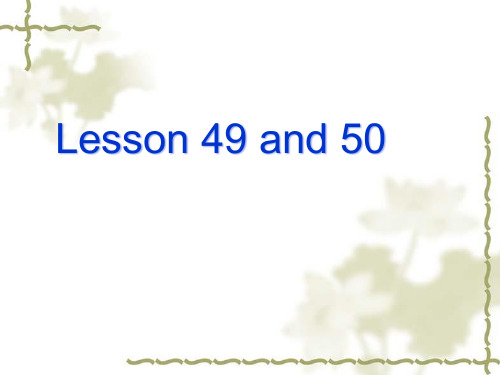
6 Yes, he does. He likes oranges, but he doesn't want any. 7 Yes, he does. He likes apples, but he doesn't want any. 8 Yes, she does. She likes pears, but she doesn't want any. 9 Yes, I do. I like grapes, but I don't want any. 10 Yes, she does. She likes peaches, but she doesn't want any.
Lesson 50 He likes… but he doesn’t like…
New Words and Expressions
tomato 西红柿 potato 土豆 cabbage 卷心菜 lettuce 莴苣 pea 豌豆 bean 豆角 pear 梨 grape 葡萄 peach 桃
Do you like…… Yes, I do./No, I don’t. Does she/he like…. Yes, she/he does. No, she/he doesn't.
一. 按要求改写句子。
1 Do you often play football after school? (肯定回答) 2. I have many books. (改为否定句) 3. Gao Shan’s sister likes playing table tennis. (改为否定句) 4. She lives in a small town. (改为一般疑问句)
新概念英语第一册第49-50课

肉馅
鸡 告诉 实情 也
★ meat 肉(食用)
Do you want any meat?
★ beefຫໍສະໝຸດ ★ lamb★ steak
★ mince
beef n.
the meat from oxen [’ɔksən] or cows
ox和bull的区别 ox指被阉割过的公牛 bull指未被阉割过的
steak n. a piece of steak
1. Mrs. Bird like lamb. Yes 2. Mrs. Bird’s husband No
like lamb too.
3. Mr. Bird likes chicken. 4.The butcher doesn’t like
No
chicken.
5. Mrs. Bird’s husband Yes
➢speak to sb.
➢speak about/ of/ on sth. ➢speak of 意为“提到、说起”
➢ speak to [with] sb (about sth)
chat 聊天
❖ chat room 聊天室 chitchat闲谈,聊天 ❖ have a chitchat 闲聊 ❖ video chat 视频聊天 ❖ have a chat with sb./chat with sb. 和某人聊
1.▲ speak作及物动词,意为“说”“讲”,其宾语常是
某种语言。如:speak French说法语; 2.表示说到什么人或事,须用介词about/ of /on引出的短 语。如:They all speak on folk music. 3.speak也作不及物动词,主要表示说话的本能和方式, 发言等。例如: The baby is learning to speak. ➢speak+ 语言
新概念英语第一册Lesson49-50Atthebutcher's课件

Language Point
语句讲授、课文讲授
如果是疑问的语气 , 怎么表达? — Do you like coffee? — Yes, I do. / Yes, I like coffee. e.g. — Does she like coffee?
— Yes, she does. / Yes, she likes coffee. — Does he want a new schoolbag? — No, he doesn't.
B. do D. doesn't
查看答案解析
答案:do 解析: 考查疑问句回答 第一因为是Yes,所以是肯定回答,排除don't和doesn't;其次I是第一人称单数,后面要跟do; 译文:“你想要些土豆吗?” “是的 , 我想要。”
下一题
— Does Sam like cabbage? — Yes, he ______ .
Language Point
语句讲授、课文讲授
如果是否定的语气 , 怎么表达? 实义动词来做谓语动词 , 应根据主语来加助动词 , 然后在 后面踉上动词原形。 e.g. I like green. → I don't like green.
He likes green. → He doesn't like green. I want a cup of tea. → I don't want a cup of tea. She wants a cup of tea. → She doesn't want a cup of tea.
把do变成does。 e.g. He / She / It does.
否定语气:doesn't + 实义动词原形。 e.g. doesn't like / want
新概念英语第一册课后题及答案Lesson49-50

Written exercises书⾯练习 A Complete these sentences using an not, aren't, isn't, can't, don't or doesn't. 完成以下句⼦,⽤am not, aren't, isn't, can't, don't或doesn't填空。
1 He likes coffee, but I______. 2 She likes tea, but he ______. 3 He is eating some bread, but she ______. 4 She can type very well, but he ______. 5 They are working hard, but we ______. 6 He is reading a magazine, but I______. B Answer these questions using I, he or she. 模仿例句回答以下问题,选⽤I, he或she。
Examples: Does Penny like tomatoes? Yes, she does. She likes tomatoes, but she doesn't want any. Do you like potatoes? Yes, I do. I like potatoes, but I don't want any. 1 Does Sam like cabbage? 2 Does Sam like lettuce? 3 Do you like peas? 4 Does Mrs. White like beaus? 5 Do you like bananas? 6 Does Mr. Jones like oranges? 7 Does George like apples? 8 Does Elizabeth like pears? 9 Do you like grapes? 10 Does Carol like peaches? 答案: Lesson 50 A 1 He likes coffee, but I don't. 2 She likes tea, but he doesn't. 3 He is eating some bread, but she isn't. 4 She can type very well, but he can't. 5 They are working hard, but we aren't. 6 He is reading a magazine, but I am not. B 1 Does Sam like cabbage? Yes, he does. He likes cabbage, but he doesn't want any. 2 Does Sam like lettuce? Yes, he does. He likes lettuce, but he doesn't want any. 3 Do you like peas? Yes, I do. I like peas, but I don't want any. 4 Does Mrs. White like beans? Yes, she does. She likes beans, but she doesn't want any. 5 Do you like bananas? Yes, I do. I like bananas, but I don't want any. 6 Does Mr. Jones like oranges? Yes, he does. He likes oranges, but he doesn't want any. 7 Does George like apples? Yes, he does. He likes apples, but he doesn't want any. 8 Does Elizabeth like pears? Yes, she does. She likes pears, but she doesn't want any. 9 Do you like grapes? Yes, I do. I like grapes, but I don't want any. 10 Does Carol like peaches? Yes, she does. She likes peaches, but she doesn't want any.。
新概念英语第一册课后练习题及答案:49-50
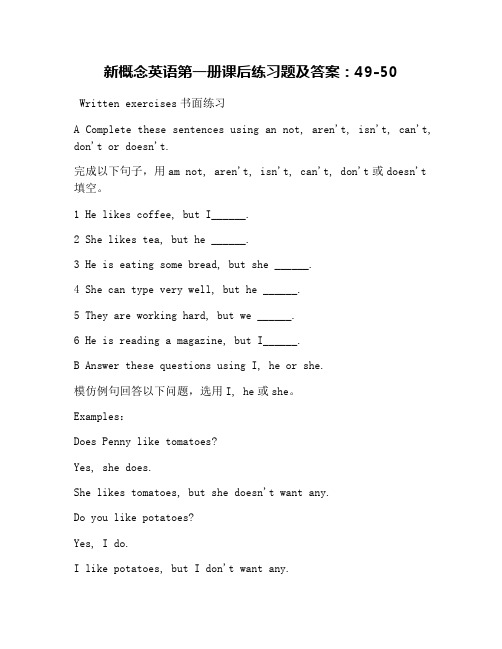
新概念英语第一册课后练习题及答案:49-50Written exercises书面练习A Complete these sentences using an not, aren't, isn't, can't, don't or doesn't.完成以下句子,用am not, aren't, isn't, can't, don't或doesn't 填空。
1 He likes coffee, but I______.2 She likes tea, but he ______.3 He is eating some bread, but she ______.4 She can type very well, but he ______.5 They are working hard, but we ______.6 He is reading a magazine, but I______.B Answer these questions using I, he or she.模仿例句回答以下问题,选用I, he或she。
Examples:Does Penny like tomatoes?Yes, she does.She likes tomatoes, but she doesn't want any.Do you like potatoes?Yes, I do.I like potatoes, but I don't want any.1 Does Sam like cabbage?2 Does Sam like lettuce?3 Do you like peas?4 Does Mrs. White like beaus?5 Do you like bananas?6 Does Mr. Jones like oranges?7 Does George like apples?8 Does Elizabeth like pears?9 Do you like grapes?10 Does Carol like peaches?答案:Lesson 501 He likes coffee, but I don't.2 She likes tea, but he doesn't.3 He is eating some bread, but she isn't.4 She can type very well, but he can't.5 They are working hard, but we aren't.6 He is reading a magazine, but I am not.1 Does Sam like cabbage?Yes, he does. He likes cabbage, but he doesn't want any.2 Does Sam like lettuce?Yes, he does. He likes lettuce, but he doesn't want any.3 Do you like peas?Yes, I do. I like peas, but I don't want any.4 Does Mrs. White like beans?Yes, she does. She likes beans, but she doesn't want any.5 Do you like bananas?Yes, I do. I like bananas, but I don't want any.6 Does Mr. Jones like oranges?Yes, he does. He likes oranges, but he doesn't want any.7 Does George like apples?Yes, he does. He likes apples, but he doesn't want any.8 Does Elizabeth like pears?Yes, she does. She likes pears, but she doesn't want any.9 Do you like grapes?Yes, I do. I like grapes, but I don't want any.10 Does Carol like peaches?Yes, she does. She likes peaches, but she doesn't want any.。
新概念一lesson49-50最全知识点
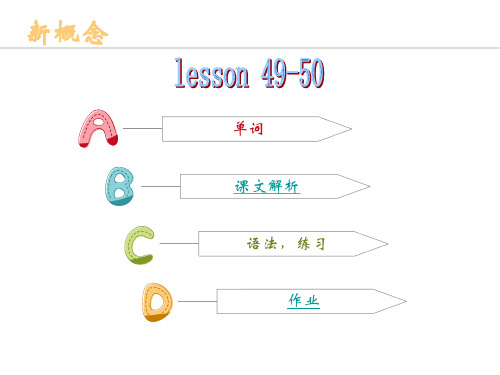
新概念
单词 课文解析 语法,练习
作业
肉类 肉类
蔬菜 蔬菜
水果 水果
we meat again
meat
!
beef
[bi:f]
steak
[steik]
lamb
S4: or • Do you want beef ↑ or lamb↓? 1.用于否定句和疑问句中.肯定句用and. 2.选择疑问句要选择其中一种答案作答 3. ↑ or ↓ or前读声调,后读降调 练习:1. Do you live in a city or a village? 2. Are you a boy or a girl?
• MRS.BIRD: And a pound of mince, too.
• BUTCHER: Do you want a chicken, Mrs. Bird? They 're very nice.
• MRS.BIRD: No, thank you.
• MRS.BIRD: My husband likes steak, but he doesn't like chicken. • BUTCHER: To tell you the truth, Mrs. Bird, I don't like chicken either!
fru:t
peə
greip pi:t∫
单词部分总结
beef,steak, lamb,mutton, fish,chicken, pork,mince
grape peach pear
新概念英语第一册课后习题及答案:Lesson49-50

新概念英语第一册课后习题及答案:Lesson49-50 Written exercises书面练习A Complete these sentences using an not, aren't, isn't, can't, don't or doesn't.完成以下句子,用am not, aren't, isn't, can't, don't或doesn't填空。
1 He likes coffee, but I______.2 She likes tea, but he ______.3 He is eating some bread, but she ______.4 She can type very well, but he ______.5 They are working hard, but we ______.6 He is reading a magazine, but I______.B Answer these questions using I, he or she.模仿例句回答以下问题,选用I, he或she。
Examples:Does Penny like tomatoes?Yes, she does.She likes tomatoes, but she doesn't want any.Do you like potatoes?Yes, I do.I like potatoes, but I don't want any.1 Does Sam like cabbage?2 Does Sam like lettuce?3 Do you like peas?4 Does Mrs. White like beaus?5 Do you like bananas?6 Does Mr. Jones like oranges?7 Does George like apples?8 Does Elizabeth like pears?9 Do you like grapes?10 Does Carol like peaches?答案:Lesson 50A1 He likes coffee, but I don't.2 She likes tea, but he doesn't.3 He is eating some bread, but she isn't.4 She can type very well, but he can't.5 They are working hard, but we aren't.6 He is reading a magazine, but I am not. B1 Does Sam like cabbage?Yes, he does. He likes cabbage, but he doesn't want any.2 Does Sam like lettuce?Yes, he does. He likes lettuce, but he doesn't want any.3 Do you like peas?Yes, I do. I like peas, but I don't want any.4 Does Mrs. White like beans?Yes, she does. She likes beans, but she doesn't want any.5 Do you like bananas?Yes, I do. I like bananas, but I don't want any.6 Does Mr. Jones like oranges?Yes, he does. He likes oranges, but he doesn't want any.7 Does George like apples?Yes, he does. He likes apples, but he doesn't want any.8 Does Elizabeth like pears?Yes, she does. She likes pears, but she doesn't want any.9 Do you like grapes?Yes, I do. I like grapes, but I don't want any.10 Does Carol like peaches?Yes, she does. She likes peaches, but she doesn't want any.。
(完整版)新概念英语一册49-50课练习

一.根据所给中文意思补全单词。
1。
b__tch__ __ (卖肉的)2.m__ __ t (肉)3.b__ __ f (牛肉)4.l__m__ (羔羊肉)5.h__sb__ __ d (丈夫)6。
st__ __k (牛排)7。
m__ __ce (肉馅)8.ch__k__ __ (鸡)9.t__ll (告诉)10.tr__th (实情)11。
__i__ __er (也)12.t__m__t__ (西红柿)13。
p__t__t__ (土豆)14.c__bb__g__ (卷心菜)15。
l__tt__ce (莴苣)16。
p__ __ (豌豆)17.b__ __ n (豆角)18. p__ __ r (梨)19。
gr__p__ (葡萄)20.p__ __ ch (桃子)二.你问我答三.用too 或 either 填空1. My sister likes hamburger. I like hamburger___________。
2。
Tom doesn’t like steak。
I don’t like steak___________。
3. She can’t swim. I can't swim ___________.4。
Do you like tomatoes___________?5. I don't know how to mend a bike。
My brother doesn't, ___________。
6。
- I'm hungry. -Me,_________。
四.单项选择( )1。
—_________she like the strawberries?- No, she ___________.A. Does, does B。
Do, doesn’t C。
Does, doesn't D. Do, don’t ( ) 2. She can type very well. But he ___________。
Lessons 49-50新概念英语第一册课后答案详解
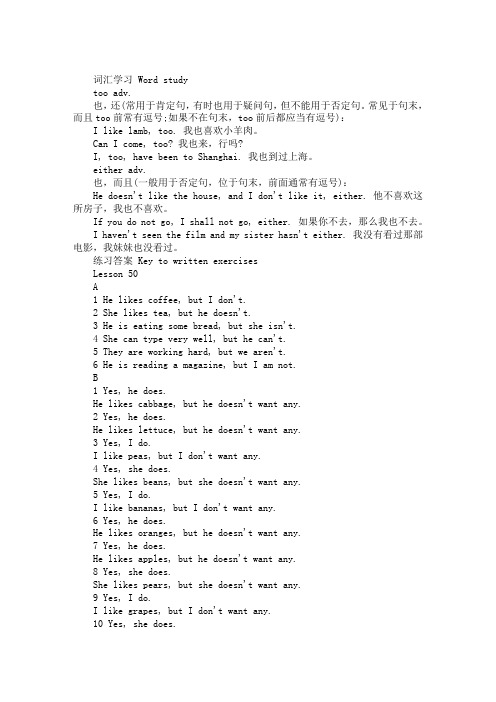
词汇学习 Word studytoo adv.也,还(常用于肯定句,有时也用于疑问句,但不能用于否定句。
常见于句末,而且too前常有逗号;如果不在句末,too前后都应当有逗号):I like lamb, too. 我也喜欢小羊肉。
Can I come, too? 我也来,行吗?I, too, have been to Shanghai. 我也到过上海。
either adv.也,而且(一般用于否定句,位于句末,前面通常有逗号):He doesn't like the house, and I don't like it, either. 他不喜欢这所房子,我也不喜欢。
If you do not go, I shall not go, either. 如果你不去,那么我也不去。
I haven't seen the film and my sister hasn't either. 我没有看过那部电影,我妹妹也没看过。
练习答案 Key to written exercisesLesson 50A1 He likes coffee, but I don't.2 She likes tea, but he doesn't.3 He is eating some bread, but she isn't.4 She can type very well, but he can't.5 They are working hard, but we aren't.6 He is reading a magazine, but I am not.B1 Yes, he does.He likes cabbage, but he doesn't want any.2 Yes, he does.He likes lettuce, but he doesn't want any.3 Yes, I do.I like peas, but I don't want any.4 Yes, she does.She likes beans, but she doesn't want any.5 Yes, I do.I like bananas, but I don't want any.6 Yes, he does.He likes oranges, but he doesn't want any.7 Yes, he does.He likes apples, but he doesn't want any.8 Yes, she does.She likes pears, but she doesn't want any.9 Yes, I do.I like grapes, but I don't want any.10 Yes, she does.She likes peaches, but she doesn't want any.。
糖果新概念lesson49--50 week1

1. 肯定句
主语+动词~ 我每天说英语。
I speak English every day. 他每天说英语。
He speaks English every day.
注:主语是第三人称单数时,动词要加s,或es
1. 否定句
主语+don’t / doesn’t +动词~ 在助动词后加not
我不是每天说英语。 I don’t speak English every day.
(西红柿).
2. Tom wants some lettuces (莴苣).
二、用所给动词的适当形式填空
1. Does
Sam like
(like) cabbages?
2. Mrs. White does
not want
(want) beans
3. Sally oftensits
(sit) near the tree.
Georgecan’t take
these flowers to her.
Lesson 50 He likes… but he doesn’t like…
make sentence (造句)
✔喜欢 不喜欢
I
✔
I like cabbages , but I don't like lettuces.
奶茶 请吃饭
5
6
新概念1-3
Lesson49-50
New Words and Expressions
butcher meat beef lamb
卖肉的mince 肉 chicken
tell 牛肉 truth 羔羊肉 either
husband 丈夫
新概念英语一册49-50课习题

Lesson49-50 At the butcher’s在肉店基础达标一单词拼写1.卖肉的 _____________________2. 肉馅________________________3.鸡 _________________________4. 实情________________________5.丈夫 _______________________6. 西红柿______________________7.豆角 _______________________8. 卷心菜______________________9.桃 _________________________ 10.葡萄________________________二选择( )1.----___she likes the strawberries?----No, she ___A. Does/doesB.Do/doesn’t C,Does/doesn’t( )2 Mid-Autumn Day usually____in September or October every year.eesC. is coming( )3.---Which would you like, tea or coffee?---__is OK,I really don’t mind.A.BothB. NoneC.Either( )4.---Is your father a doctor?----Yes,he is .He ___in Town Hospital.A.has workedB. had workedC.works( )5.Mike Jordan is a basketball star.I like __very much.A.heB. himC.his( )6.----Hi! What are you doing?----We ____about a football match.A.talkedB.are talkingC.talks( )7.Look! The girls ___goodbye to their grandma.A.sayB.saysC. are saying( )8.----What does Steven usually do first in the morning?----He usually ___his face and hands first.A.washesB.washedC.washing( )9.Carter doesn’t like eating fast food, and I don’t ,____.A.tooB. eitherC.also( )10.---How delicious the food is !---Would you like ___more?A.muchB.someC.any( )11.Jim is American.____he can speak very good English.A.ifB.soC.because( )12.---Who cleans the room every morning?----Jimmy ____.A.cleansB.doesC.is cleaning( )13.----We never know ___he wants.----They say he wants a baby boy.A.whomB.whatC.which( )14.He is thirsty.Please give him some___to drink.A.riceB.meatC.water( )15.Don’t forget to___thank you when someone has helped you.A.speakB.sayC.tell能力提升三阅读My sister has two sons, one is 4years old and the other is 6 years old. One day I go to see my sister. Her husband isn’t at home. It’s time for lunch and we sit at the table waiting for the dishes. Now the mother is in the kitchen. I hear a talk between the brothers. The 6-year-old boy says.“Dad is not at home. I am the head of our family today. And I can sit on dad’s chair.”But the 4-year-old boy says, “No. Sit on mum’s chair if you are the head of our family today.”( ) 1.My sister has two boys.( ) 2.The father is at home.( ) 3.The 6-year-old son wants to sit on father’s chair.( ) 4.I’m in the kitchen.( ) 5.The mother is the head of the family.四改错1.I want any beef ,please.2.She likes potato, and I don’t like.3.Johnson comes from American, so he loves fried chicken.4.Where are you come from?5.He is one of my best friend.五.翻译1.请把那块牛排给我。
新概念英语第一册第49-50课-At the butcher's

新概念英语第一册第49-50课:At the butcher'sLesson 49 At the butcher's在肉店Listen to the tape then answer this question. What does Mr. Bird like?听录音,然后回答问题。
伯德先生喜欢什么?BUTCHER: Do you want any meat today.Mrs. Bird?肉商:您今天要买点肉吗,伯德夫人?MRS.BIRD: Yes, please.伯德夫人:是的,我买一点。
BUTCHER: Do you want beef or lamb?肉商:您要牛肉还是要羔羊肉?MRS.BIRD: Beef, please.伯德夫人:请给我牛肉。
BUTCHER: This lamb's very good.肉商:这羔羊肉很好。
MRS.BIRD: I like lamb,but my husband doesn't.伯德夫人:我喜欢羔羊肉,可我丈夫不喜欢。
BUTCHER: What about some steak?This is a nice piece.肉商:来点牛排吗?这块很好。
MRS.BIRD: Give me that piece, please.伯德夫人:就请给我那块吧。
MRS.BIRD: And a pound of mince, too.伯德夫人:再来一磅绞肉。
BUTCHER: Do you want a chicken,Mrs. Bird?They 're very nice. 肉商:您要买只鸡吗,伯德夫人?这些鸡很好。
MRS.BIRD: No, thank you.伯德夫人:不要了,谢谢。
MRS.BIRD: My husband likes steak,but he doesn't like chicken. 伯德夫人:我丈夫喜欢牛排,但他不喜欢鸡。
新概念英语第一册第49-50课
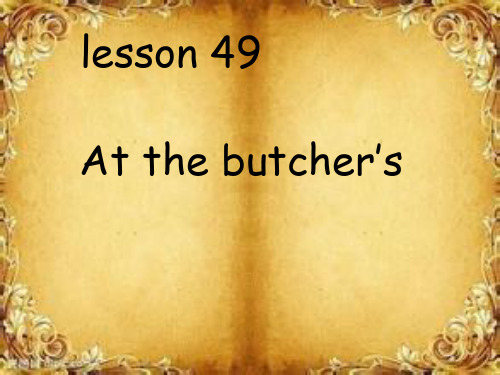
B Answer these questions using I, he or she. 模仿例句回答以下问题,选用I, he或she。 Examples: Does Penny like tomatoes? Yes, she does. She likes tomatoes, but she doesn't want any. Do you like potatoes? Yes, I do. I like potatoes, but I don't want any.
tell:tell sb. sth. 告诉某人某事 tell sth. to sb. 告诉某人某事 tell sb. about/of sth. 向某人讲起
Flash words
• • • • • • • Butcher [‘butʃә(r)] meat [mi:t] beef [bi:f] lamb [lӕm] steak [ steik] mince [mins] chicken [tʃikin]
Do you want a chiken, Mrs. Bird? They are very nice.
可数:(一整只) 鸡 不可数:鸡肉
No, thank you.
My husband likes steak, but hen.
说实话,老实告诉你
To tell you the truth, Mrs. Bird,
Do you like running man?
一般现在时
肯定结构 1.主语 + be +其它. 如:It is cold today. 2.主语 + 动词原形+其它 如:I want an apple. 3.主语 + 动词+s/es(第三人称单数作主语时) 如: She likes apples.
- 1、下载文档前请自行甄别文档内容的完整性,平台不提供额外的编辑、内容补充、找答案等附加服务。
- 2、"仅部分预览"的文档,不可在线预览部分如存在完整性等问题,可反馈申请退款(可完整预览的文档不适用该条件!)。
- 3、如文档侵犯您的权益,请联系客服反馈,我们会尽快为您处理(人工客服工作时间:9:00-18:30)。
Have you ever been there?
butcher
---Do you eat meat every day? 你每天都吃肉吗? --- I like meat very much
Lesson 49 At the butcher‟s
New Words and Expressions
She's as gentle as a lamb. A lamb is as dear to a poor man as an ox to the rich. 穷人的一只羔羊比富人的一头 牛还要珍贵。
mince
n. (UC)
I want a pound of mince. Because I want to make some dumplings .
C
练习二:选用 say speak talk tell的适当形式 填空。 says 1. He ____ he is busy. speak 2.What language do you __ ____﹖” speak Chinese.″ ″I ______ talking loudly to the 3. The teacher is ____ students. talking/discussing 4. She is ____ ________ with her classmates. tell me the news. 5. Please ___
练习一:
1. Did he _____ it in English? A. tell B. speak C. say D. talk A 2. The teacher _____ us to finish the homework in time. A. tells B. speaks C. says D. talks D 3.What would you like to ______ us about your hometown. A. speak B. talk C. say D. tell
1.
1.▲
speak作及物动词,意为“说”“讲”,其宾语常是 某种语言。如:speak French说法语; 2.表示说到什么人或事,须用介词about/ of /on引出的短 语。如:They all spoke on folk music. 3.speak也作不及物动词,主要表示说话的本能和方式, 发言等。例如: The baby is learning to speak. speak+ 语言 speak to sb. speak about/ of/ on sth. speak of 意为“提到、说起” speak to [with] sb (about sth)
lamb n. (uc) the meat from lambs e.g.: Do you want beef or lamb ? Beef , please . Lamb , please .
a lovely lamb
a wolf in sheep‘s clothing 披着羊皮的狼, 口蜜腹剑的人
ox和bull的区别 ox指被阉割过的公牛 bull指未被阉割 过的
Do you want any beef ? There isn‟t any beef on the plate.
steak n. (UC) a piece of steak
steak
---How do you like your steak? 你想怎样吃你的牛排? --- Steak rare/medium/well-done. 生些/五分熟/全熟。 Waiter, this steak is too rare. 服务生,这牛排太生了。 How will you like your steak? Rare! 您要怎么做的牛排?嫩些的! Would you like the steak well done or rare? 你喜欢牛排煎得透一点,还是略生一点?
I like lamb, too. 我也喜欢小羊肉。 Can I come, too? 我也来,行吗? I, too, have been to Shanghai. 我也到 过上海。
either一般用于否定句,位于句末,前面通常 有逗号。 too常用于肯定句,有时也用于疑问句,但不 能用于否定句。常见于句末,too前常有逗号; 如果不在句末,too前后都应当有逗号。 also 用于肯定句中,位于居中
chicken
n.
★ chicken n.鸡,鸡肉
hen [hen] 母鸡
chick [tʃik]小鸡
cock [kɔk] 公鸡
翻译:
1. 房子后面有一些鸡。 2. ---你想吃些什么? --- 我想吃些鸡肉。
1.
There are some chickens behind the house. 2. What do you want to eat? I want to eat some chicken.
chat 聊天
chat room 聊天室 chitchat闲谈,聊天 have a chitchat 闲聊 video chat 视频聊天 have a chat with sb./chat with sb. 和某人聊 天 AV=adult video
Discuss 讨论,争论。 I will discuss this question with my teacher after class.
truth n.实情,事实
true adj. 真实的 truly adv. 1. 真正地2. 忠实地, 真诚地
come true 梦想成真 come into reality true lie 真实的谎言
The truth is … 真相是/事实是… The truth is you are gay!!! find out the truth 找到真相
在英文表示“某一商店”的商店中,往 往可以把shop省略,如课文中的the butcher‟s (shop)和the greengrocer‟s (shop)蔬菜水果店,类似的例子还有the hairdresser‟s (shop)理发店,the stationer‟s (shop)文具店,the doctor‟s (office)诊所,my mother‟s (house)妈妈的 家等。
butcher meat beef lamb husband steak
卖肉的 肉 牛肉 羔羊肉 丈夫 牛排
New Words and Expressions
mince chicken tell truth either
肉馅 鸡 告诉 实情 也
★ butcher n. a person who sells. My husband likes steak . I like steak, too . =I also like steak . Do you like steak too ? My husband doesn't like chicken I don't like chicken, either .
tell the truth 说真话 tell a lie说谎 tell the time “报时“ tell a story讲故事 tell about a person / a game / a success tell sb. sth./ tell sth. to sb. tell sb. to do sth. tell : 辨别,说出区别 tell A from B tell the differences between A and B
▲say是“讲,说”的意思,强调说话内容。一般作及物动词, 常用于直接引述所说的话或间接叙述所说的话。例如: Say it in Chinese please. 请用汉语说。 He says: ″It„s great.″他说:“好极了。” He says that he saw the man yesterday. 他说他昨天 看见这个人了。 My English teacher always says that I’m a good student. say+ 说话内容 2. say to sb. 3. It is said that... 意为“据说”。如: It is said that he could stay under the water for a long time. 据说他能呆在水里很长时间。
e.g.: The old man is a butcher . at the butcher's a place where you can buy meat eg: The boy is at the butcher's . He wants to buy some meat .
I have to go to the butcher‟s. doctor – doctor‟s
▲talk意为“讲、谈论,谈话”是不及物动词,
常和to with about 连用如: They are talking about the film. 他们正谈论这 部电影。 The teacher is talking with Mike. 老师正和迈 克谈话。 I want to talk to you. talk to/ with sb. about sth. have a talk with 意为“与......交谈” give a talk做报告 (talk n.报告) have a talk听报告 talk show 脱口秀
★ tell v. 过去式 told I told you something about my husband just now .
